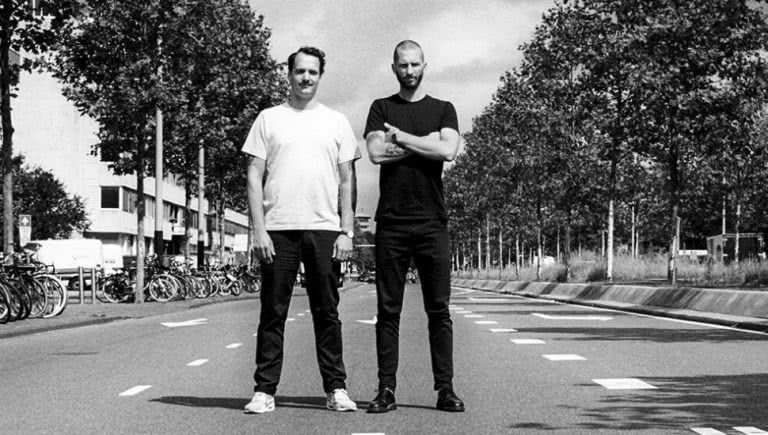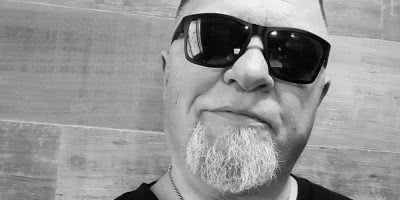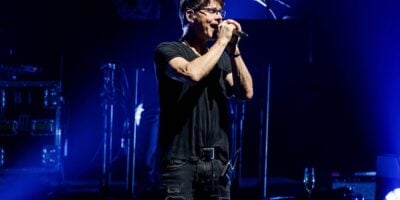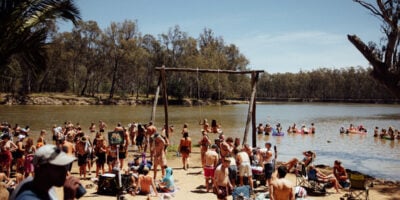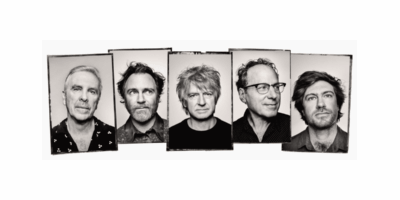Lars Dales and Maarten Smeets are Detroit Swindle and have had quite a run in the last decade. From making music for the hell of it, to making tens of thousands of fans all over the world happy with their releases, mixes and performances, they have seen their star rise in a seemingly unstoppable manner.
With a string of releases on renowned labels like Dirt Crew, Freerange, Tsuba and their own Heist Recordings, they’ve cemented their place in the House Music scene by keeping true to their roots and keeping diversity and authenticity at the centre of their story.
Notorious for their energetic DJ sets at clubs like Panorama bar, Fabric or Social Club and praised for their productions with that signature shuffle and those carefully designed drops, they put as much energy into their music as they have always done and they are treasured for it. They have their own label Heist Recordings and one thing is clear, they refuse to be tied to any given genre, celebrating the broad fabric of House Music in all its forms.
Despite being in isolation (this interview took place in the last week of May 2020), the duo is still really busy. They are releasing two tracks on the 5th June; ‘Coffee in The Morning and ‘Move Out The Way’ with vocalist Jitwam which speaks to the soul of their creativity and they should be roundly applauded for releasing material in what are very challenging times.
We are therefore extremely grateful that Maarten Smeets talked to us on the phone for over an hour to tell us the Swindle story.
So Maarten welcome to the Switched On family. How have you been handling the pandemic and has it given you a different perspective on life?
Well, the entertainment industry was the first one to suffer. We saw our events getting cancelled very early on. I think the gig that got cancelled first was actually our tour in the US. We woke up, I think it was like a Friday morning, two weeks before the tour in March, with an email from our agent saying, ‘Hey you guys, Trump has closed down the country.
Love Music?
Get your daily dose of metal, rock, indie, pop, and everything else in between.
So it’s going to be hard for you guys to tour here if all the borders are closed’. That was the first thing that we noticed and we soon realised it was really happening. I think within a week, we saw that pretty much everything was getting cancelled. All the countries were tightening the rules on social distancing.
That was a bit of a heavy changeover for us because we went from touring full on every week to not touring at all. It’s weird because your whole life was touring. It means getting up Friday morning, taking a plane, playing and arriving back home on Sunday night and trying to do as much as you can during the week and spend some time with the family.
Now suddenly all that travel was done with, which was a relief, but gigging was gone as well. It’s a shame as we really like DJing. We like playing music and we like visiting different countries; seeing what kind of music works in different cultures. So that was a big change. The upside of not having to travel anymore, because it can be tedious and tiring and heavy on the mind and body, was outweighed by the fact that what we lost three quarters of what we do.
But there is a plus. We work as a duo. We’re not actually allowed to be in one room together because we’re not family and don’t live in the same household. We therefore decided to split the work up a bit. I get to work in the studio because I have three kids at home.
We’ve taken on a few more remix projects than we would usually do, which is great because we’ve managed to secure a couple of really fun projects. So that was actually a great change for us because we both really enjoy the production side of our work.
It hasn’t been like that since we started touring in 2012. We have never taken as much time off of touring as we have done now. Even though it’s not our choice, it feels really nice and it feels like it gives us room for new creativity and allows us to look at things from a different perspective; like how we run our label and how we’ve run our business so far.
We’ve had the opportunity to vary our activities a bit which is also nice. Obviously, we have to deal with less income. So that’s always a bit of shame but there’s loads of people out there that have it way harder than us. So I’m not gonna cry about it. For me personally, it’s been a bit more complex because my wife works in one of the big hospitals in Amsterdam with people that have leukaemia.
So the security measures that they have in place are intense. What that meant for us is that we had to be super strict with our lockdown as well. So that was a bit heavy for me and the kids. It’s a new world right now.
So I think the next six months will see some incredible music come out?
I’m super interested to see what happens. Obviously, there’s a bit of a delay between production and music actually. People are either starting new projects or maybe dusting off old projects that they always wanted to finish. So that’s going to be exciting. That’s going to be interesting.
I really hope that the market will stay intact. For our label, we still see sales going well and obviously streaming is important. From a creative perspective, I think a lot of nice projects will come out. The challenge of course for everyone, is how to make music together if you’re not allowed to be in a room together.
For bands doing session recordings, it’s going to be a bit more working with Zoom session recordings. Might not be as fun as a personal session but it saves a lot of flying.
So you grew up in Amsterdam?
We both lived in Amsterdam for a long time; Lars is still there. I actually live 20 minutes outside of the city in a lakeside area. Me and my wife both felt it was time to get a little bit more space. Spend time with nature a bit more. Amsterdam is where our studio is and where we meet and where most of our life has taken place.
Born in the early part of the 80s. House Music was an already established genre by then; what appealed to you as you headed into your teenage years about House Music?
Actually, to be honest, House Music was not a thing where I grew up. People were into bands and rock music and I played drums with some high school friends and we did punk.
We liked surf punk and that was our big thing. So House Music was, I think, more of a big city thing. It only really reached me when I moved to Amsterdam in the late 90s, early 2000s. I know for Lars on the other hand that he was a club kid and he had a fake ID and went to all the raves.
The feeling I get is that for a lot of DJs there needs to be an accumulation of musical genres to be able to develop a sound as they go into music production.
Yeah, I think I think that you could be very right with that. For me, I’m very easily bored with repetition which is a weird contrast because House Music is all about repetition; I need to find different new genres and different types of music to cater for different types of mixing and applying different types of effects to really get inspired. That can come from anything.
I still like the raw feel of that punk. I really liked that a lot and how they had dub influences as well as being able to deliver a harder sound. I think musical diversity is a blessing and it’s something to embrace. Lars loves hip hop as well and is a huge De La Soul fan. We go through everything.
I was just compiling a Spotify all night long playlist to go along with our new release. It was doing my head in over how to approach that because obviously you can’t compile a list of 1000 songs. Because I like so many genres, it’s hard.
Where do you begin? Where do you end? All these different types of inspirations that have shaped my view on music. They have also shaped the sound that we put out with our own productions and our DJ sets. It’s super varied.
I’ve noticed that you’ve also started getting into that Afro sound lately. What is it about that genre that some appealing to you?
There are so many things. I think as DJs we’ve been playing Afro related or Afro inspired music for a while now. If you look at our productions, it’s been there. I think one of our releases on Freerange, five or six years ago, was an afro house record.
And then on our latest album, in 2018, we did an Afro song with a Dutch brass band. So it’s been there but the recent remixes we did for Pat Thomas and The Mauskovic Dance Band, they are full-on Afro.
The nice thing about Afro is that everything is lively. There’s so much energy in it even with percussion that’s over six or seven minutes long and that’s just slightly offbeat or changing. It’s so vivid and everything is connected. Even sometimes when the drummer is kind of losing the rhythm, when they get back into the groove you have that uplifting energy.
Bubblegum music is also inspiring because of the fact that its music made with very limited means. You hear and feel the energy of the singers and the artists playing it. It’s a really honest and true genre. That’s what I really like about it; the unpolished raw feel gives it so much authenticity.
The fact that we get to work with all these original artists and work on the stems of some great recordings is very rewarding. It’s great to put your own personal touch on it. Obviously, we have a more electronic approach so it’ll sound different. But for us, the chance to work on these tracks and give it our own perspective, the club perspective, is amazing.
Detroit Swindle was really an homage to Detroit and the Motown experience. Motown has those big sweeping arrangements of musicality with your music of being more of that deep house stripping much of that production away. How do you align those different concepts?
The reason we chose the name; it’s the common ground we have. We both grew up with Motown and we really like Marvin Gaye and artists like that; acts that we’ve heard over and over again during our childhood. That’s why the name is really appropriate for us.
In terms of musicality; House has a different approach. I already mentioned the fact that it’s mostly based on repetition. So the many changeovers that there are in most soul songs are just too much. You need to strip it back to the essentials and find a tight groove that gets people in; like a little bit of a hypnotic seal.
We use the catchiest part of a song or the catchiest part of a certain chord progression and we build around that. They all have these thermal changeovers or different chord progressions and we can build so many elements around that little piece of groove we find. That could be a two-bar sample. There are so many things you can build around that.
Simplicity is our main challenge. To go back and take older records to their simplest form and to strip them of all the excess waste and all the stuff that is actually unnecessary to portray the message of the song. It’s not about getting 10 or 15 different elements or extra elements in; it’s about the opposite.
And is that the driving element behind why you have resisted the temptation to go for commercial?
No, I think the driving element behind that is actually most of what we really like is just not commercial. We’ve had many opportunities to do really commercial remixes and work with artists that really want to make it in the mainstream area.
It’s just not what makes us tick. I can listen to some music, pop music or jazz, that’s super popular and really appreciate that. But the stuff I like most is very uncommercial. It’s very low key.
I mentioned Spotify playlists earlier. I was going through my Discogs page of all the records that I’ve been buying the last few years just to see where to start. Most of the stuff I buy, I can’t even find on streaming sites. So, my take and I think our combined take on it is, that luckily, what we produce is popular enough for us to be popular.
I was gonna say it all stems back to when you originally met where Lars had to sack you for playing too much underground. So you have stayed true to yourself, right?
Well we both were making money with something else. When we started, we said, ‘all right, this just has to be for the love of it’, because of the type of music we really love to play and produce.
Our endgame wasn’t to make a living out of this. That kind of just happened. So when it did happen, we decided to embrace it and honour it by staying true to what we started. So everything we remix, or every track we make, needs to be something that we make out of love and belief in the music.
Being commercially viable is not part of the decision-making process because we feel that when you start to do that, it’s a very slippery slope towards making music for money.
When you start making music purely for money it becomes less and less from the heart. Suddenly, you end up not getting booked for the kind of parties where you get to play the music you love.
People will only remember you for the commercial stuff you’ve done and then you’ve wasted all that energy on building a profile. Suddenly that’s lost. So, for us as producers and as DJs, I think there’s no other way. I’d rather make less money and have more fun than the other way around.
That brings us to the fun that you have in the live performance space. Because you tend to put on shows with the inclusion of a keyboardist like Lorenz Rhode it becomes an event rather than a DJ experience. How important is that to you?
We both feel that the experience of dancing should build up towards something. When we are in full control of a line-up we can build something exactly the way we want. When you don’t have that control its way harder to connect.
With full control, you can take the audience on a path that you’ve decided on; whether it’s three, six or 12 hours. It all adds up to something. The more you’re in control, the more you get to introduce people to the music that you that you really want to play.
You can kind of ease people into listening to something that they weren’t planning on listening to or that they’ve never listened to before.
When you only have an hour to play there’s loads of stuff happening around you. There’s not much of a story to tell. So, with an added keyboard player at a live show, we get more flexibility and we get more of the live energy that we really like in our music.
We also get to take people along with old genres that we like. If we do an all-nighter, we start at 90 BPM with downtempo Disco or hip hop even and slowly move towards some faster tracks. We build up the tempo and we change from genre to genre; like 110 BPM, Bubblegum or South African dubs. Then towards House and then Electro and Techno and up-tempo disco.
The awesome Highlife came out in 2018. Looking back on it now what does that album means you?
Wow. It was a really special process because for the first time we really took time off touring to write music whereas normally we just wrote music in-between gigs. This was recorded in a unique way for us.
If I look back at it, I don’t think we could write it again. It could have only been written then. Lorenz was a big part helping with it; writing the key parts for pretty much half of the album.
We rearranged our whole studio and put some synths in. We also had this chance meeting with Tom Misch who came to Amsterdam afterwards for recording sessions.
The whole album was unplanned, sound wise, and unplanned in terms of what we wanted to achieve. We just wanted to explore our sound. I think when I listen to it now it gives a really good perspective of all of our interests. So yeah, I’m still super happy that we got to write that.
We know you started out in a completely digital environment, but you gradually incorporated more analogue processes into your production techniques. Is that because you like to challenge yourself because it’s infinitely harder in the analogue space?
Yeah, definitely harder and more time consuming. Machines don’t necessarily respond the way they should. Especially old machines which sometimes do completely different things (from what you intended). Then you need to find out if something’s broken or shut down.
You need to turn them off and on and some synths don’t have midi so there’s no sequencing. You have to do everything live and edit it. But it’s just the feeling of sitting behind the keyboards or the drum computer, making use of that device rather than using your mouse and clicking on some stuff or automating everything.
The likelihood of doing something that you didn’t really plan but actually found really interesting is high. Purely because the filter resonance was a bit too high or something or just because the reverb in the patches you’ve made is different from what you thought it would be. It gives you a few more surprises and it feels more real.
Even though VSTs can sound great, just the feel of playing a synth and touching the knobs with your hands, making your own patches while you’re playing, rather than having a sequence running from a MIDI clip; that for me feels infinitely more interesting.
That’s just personal. I really enjoyed the way we worked before as well. But to be honest, producing with two people behind the one laptop is not that exciting.
I’m gonna ask you a DJ question now because you’ve been on this journey. What weapons does a good DJ need?
I think the most important weapon is originality and timing. You need to find your own sound. If you don’t have your own sound, you can be anyone and anyone could be you.
You need to find something that fits with you and that hopefully will connect to a big enough crowd to get enough people moving in the club. But to be a really good DJ, you need to know when to take risks, when to go safe or when to build up a bit longer and then go for your delivery.
If you go to a festival and a DJ just plays hit after hit after hit after hit for an hour and people go there because they just want to be able to say I’ve seen this DJ at this festival; well yay for them. But for me, that’s not that’s not the art of DJing… Anyone can plan a show and if you have enough hits behind your name, you can play live off those hits.
But the interesting part for me as a DJ is when you actually get the crowd moving to music that they never expected to hear and never expected to dance to. You unleash all these new emotions.
And for me that’s also why the combination of Lars and me works so well together because Lars is really good at finding the moment of delivery and when you need to throw in a bomb; I’m really good at extending the track and throwing in the odd-balls.
People know what kind of vibe they’ll get when they come to see us play but they never know what they’re going to hear. We have a certain energy in our sound and our music but whether we play one Detroit song or zero Detroit songs, our DJ sets are always different and full of surprises. So I think a combination of those factors makes for a good DJ.
Even when you’re touring as much as we do, there’s nights where you can really feel the connection with the crowd but sometimes it’s just not there. But the most memorable nights are the ones where you feel like you’re part of the crowd.
You’re not standing on a stage far away but you’re connected and get the opportunity to play anything you like. You just know that whatever you play, people will be into it. And those occasions are amazing. And that’s why I love being a DJ.

Let’s talk some Amsterdam industry stuff. The ADE festival used to be a very community-based affair. Now it’s grown to this really big occasion. Do you think that’s detracting from what it was originally set out to achieve?
That’s a hard one because I understand their path. I mean, I’ve been going for such a long time and I’ve been organising events so I know the struggle in general.
For ADE, the popularity grew and the organisation also needed to find a way to actually make it economically viable. So obviously they connected with bigger artists or bigger labels to get the mainstream people to actually buy tickets. I get that.
What I don’t like about ADE is that it’s very, very hard to have a normal party. People arrive at your party and they help build your vibe but there is this mentality of party hopping.
They visit maybe four or five events on the night so you lose half of your crowd every hour and a half. That’s really hard to build a connection with an audience because the story is always changing. The new arrivals don’t have a clue about the idea of the night.
That’s a bit of a shame; they can still have fun and they can still listen to my records, but they won’t get the full package.
On the other hand, we’ve done three or four hostings at the same venue and we’ve always had a super steady following with our label and for Detroit Swindle. We’ve always really enjoyed our nights and we don’t have that many industry people networking on the nights themselves.
We tend to meet everyone during the week, during the day or outside of the clubs and make sure that the events are still about that love of music
I know some people from Amsterdam leave the city because it becomes touristy x 10. Normally Amsterdam is already full of tourists but at ADE time its super hectic. On the other hand, an event like that in our city is an amazing opportunity for us to catch up with people that we haven’t seen in a while and who we only get to see when we’re in South America or Australia or wherever.
Suddenly everyone’s in Amsterdam and you can show them your favourite coffee spot and catch up on releases, hand out records rather than posting them. So there’s so many advantages.
Okay so that leads me to who’s your favourite DJ behind the decks.
I really enjoy guys like Hunee and Antal and a guy from London called John Gomez. He has an amazing taste in music and a large collection of Brazilian and South American music.
We play together with him and every time he surprises me with something that I’d never heard before but which feels like I should have it in my collection. So, yeah, I’m a big fan of his music
Who do you need to thank for where you are in your life right now?
I need to thank Lars because without him we wouldn’t be where we are and I think he would thank me because it’s really obvious.
My wife, for sure. She made so many sacrifices for me to be able to do this. The moment we started touring full time was the moment when our first kid was born (my daughter).
She decided to cut back on work for me to be able to do more and then at some point we decided together that she would take time off full time to be able to run the family. Without her this would never have been possible.
Quickfire Round
- DAW? Ableton
- Favourite keyboard? The Korg Monopoly.
- Preferred Decks? SL 1200s
- Favourite Mixer? Carmen Rotary. We take it on tour.
- Favourite Sound? Waves crashing on the beach.
- Love is…? Compassion.
- Favourite club? In Australia … Revolver
- So besides playing back to back with Lars, who would be the one person that you’d love to play back to back with? Soundstream
- What are you most proud of? I am at this point really proud of how, me and my family are dealing with the challenges in life. We’re very open minded and I’m proud of being open minded.
So finally, this is a fun question is not meant to be anything sinister in this. So your family gets a phone call to say you’re in a bit of trouble. What friend are you with?
My friend Pete.
He’s always up to no good. Whenever we’re on a night out you just know it’s gonna be trouble lol































